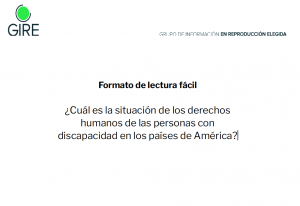
(2022) With this publication, GIRE celebrates three decades of work in pursuit of reproductive justice in Mexico.
It gathers testimonies from people who have supported its work in different ways, as well as from those who have placed their trust in the organization to accompany them in their search for justice.

(2022) This document provides key legal definitions and concepts related to the regulation of abortion in Latin America.
It aims to establish a common ground to strengthen the analysis of both progress and setbacks, and to support strategic discussions on the issue.

(2022) The Mexican Supreme Court has played a key role in the defense of reproductive rights.
Since 2007, it has issued landmark rulings that recognize access to abortion as a human rights issue.
This document, written in plain language, analyzes nine of those rulings issued between 2002 and 2021.

(2022) This document is a shadow report, written in an easy-to-read format, submitted by GIRE to the Inter-American Commission on Human Rights.
It addresses the barriers faced by people with disabilities in accessing reproductive health services, including legal and safe abortion.

(2022) The Committee on the Rights of Persons with Disabilities recommended that Mexico systematically collect data and statistics on the situation of women and girls with disabilities, using indicators that can assess intersectional discrimination.
However, this obligation has not yet been fulfilled.

(2022) GIRE prepared this report for the review of Mexico’s combined second and third periodic reports before the Committee, as part of the assessment of the country’s implementation of the Convention. The review is scheduled to take place during the Committee’s 26th session in Geneva.
The report addresses key issues such as access to abortion and obstetric violence.

(2021) This report shows that in Aguascalientes, the criminalization of abortion is the result of collusion between the state Congress, the Prosecutor’s Office, government authorities, and conservative groups seeking to impose a vision that prioritizes motherhood as a duty for women over their health and human rights.

(2021) This research explores the state of maternal health in Yucatán.
It highlights the urgent need to ensure comprehensive care with an intercultural perspective and, in the case of Valladolid, the importance of rethinking access to adequate health services beyond state capitals.

(2021) While public debate on the decriminalization of abortion in Mexico must continue, the recognition of reproductive rights is a historic achievement for women.
Submitting what has already been recognized in the legal framework to public consultation represents an unjustified setback.